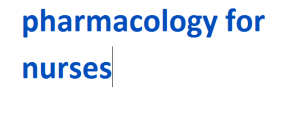pharmacology for nurses 2024-2025
pharmacology for nurses 2024-2025

Pharmacology is an essential part of nursing practice that involves the study of drugs and how they interact with the body. Nurses are responsible for administering medications to patients, monitoring their response to treatment, and educating them about the use of medications. Therefore, a thorough understanding of pharmacology is crucial for nurses to provide safe and effective care to their patients.
- Pharmacology for nurses encompasses a wide range of topics, including drug classifications, mechanisms of action, side effects, adverse reactions, and drug interactions. Nurses must have a solid understanding of these concepts to ensure that medications are administered safely and appropriately.
- One important aspect of pharmacology for nurses is understanding drug classifications. Drugs are classified based on their therapeutic effects and their chemical structures. This classification system helps nurses to identify drugs and their potential effects on the body. Some common drug classifications include antibiotics, analgesics, antihypertensives, and anticoagulants.
- Another important concept in pharmacology for nurses is the mechanism of action. This refers to how a drug works in the body to produce its therapeutic effects. For example, some drugs work by blocking specific receptors in the body, while others work by increasing or decreasing the production of certain chemicals. Understanding the mechanism of action of a drug can help nurses to predict its potential effects and monitor patients for side effects and adverse reactions.
- Side effects and adverse reactions are also crucial concepts in pharmacology for nurses. Side effects are unintended effects of a drug that may occur in addition to its therapeutic effects. Adverse reactions, on the other hand, are unwanted effects of a drug that can be harmful or even life-threatening. Nurses must be able to identify and manage side effects and adverse reactions to ensure the safety of their patients.
- Drug interactions are another important aspect of pharmacology for nurses. When two or more drugs are taken together, they may interact with each other and produce unexpected effects. Some drug interactions can be harmful or even life-threatening. Nurses must be able to identify potential drug interactions and take appropriate measures to prevent them.
- To become proficient in pharmacology for nurses, nurses must receive adequate education and training in the field. Nursing education programs typically include courses in pharmacology, which cover drug classifications, mechanisms of action, side effects, adverse reactions, and drug interactions. Continuing education programs are also available to help nurses stay up-to-date with the latest developments in pharmacology.
- In addition to education and training, nurses can also use various resources to enhance their understanding of pharmacology. For example, drug reference books and online databases can provide detailed information about specific drugs and their uses, side effects, and interactions. Nurses can also consult with pharmacists and other healthcare professionals to gain additional insights into the use of medications.
- In conclusion, pharmacology for nurses is an essential part of nursing practice that requires a thorough understanding of drug classifications, mechanisms of action, side effects, adverse reactions, and drug interactions. Nurses must receive adequate education and training in pharmacology to ensure that medications are administered safely and effectively. Additionally, nurses can use various resources to enhance their understanding of pharmacology and provide the best possible care to their patients.
Click here for South African Nursing Colleges and Schools Application 2023-2024
RELATED LINKS